Medals 2019
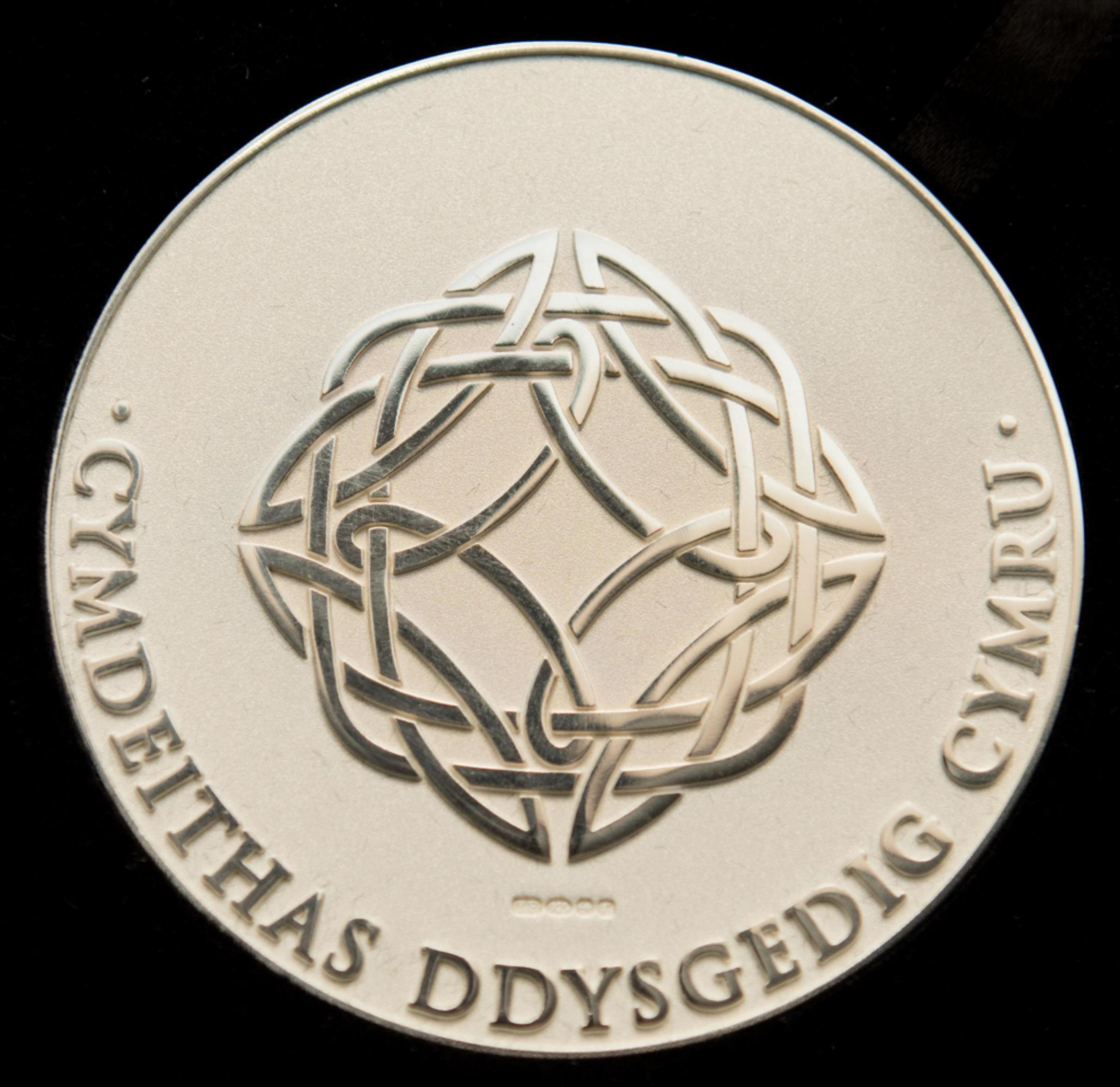
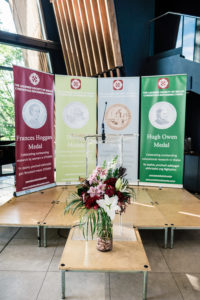 The medals of the Learned Society of Wales were awarded last night at the Royal Welsh College of Music and Drama in Cardiff in a ceremony celebrating achievement in academia.
The medals of the Learned Society of Wales were awarded last night at the Royal Welsh College of Music and Drama in Cardiff in a ceremony celebrating achievement in academia.
The medals recognise outstanding contributions in research and scholarship. They are a celebration of the achievements of both the individuals honoured and of the academic sector of Wales, from universities to schools.
The medals were created to inspire and recognise the long (and often overlooked) legacy of Welsh achievement while celebrating the exceptional researchers of today.
This year, seven medals, all named in honour of significant figures from Wales’ history, were awarded.
 The Frances Hoggan Medal recognises the contribution of outstanding female researchers in STEMM who have a connection to Wales. This year, Professor Tavi Murray FLSW from Swansea University received the medal in recognition of her work in glaciological research.
The Frances Hoggan Medal recognises the contribution of outstanding female researchers in STEMM who have a connection to Wales. This year, Professor Tavi Murray FLSW from Swansea University received the medal in recognition of her work in glaciological research.
A world-leading Environmental Scientist, Professor Murray works at the cutting-edge of glaciology and has blazed a trail in the innovative application of geophysics and remote sensing techniques in this field. She is an eminent interdisciplinary researcher and bridges physics, geography and computer science in her quest to provide improved constraints on glacial contributions to global sea-level rise. On receiving the award, Professor Murray said: “I am really honoured and delighted to be awarded this medal by the Learned Society of Wales. My research is aimed at making better predictions of sea-level rise from the ice sheets in Greenland and Antarctica, which is so important to our planet’s future. I hope to inspire more young scientists, especially girls and women, to work in science and on environmental issues and climate change”.
The Society’s Dillwyn Medals are awarded in recognition of outstanding early career research. Reflecting the exceptional quality of the nominations received this year, in two of the medal categories, the Society has for the first time, chosen to award two medals to early career researchers in Science, Technology, Engineering, Mathematics and Medicine (STEMM), and a further two medals in the Social Sciences.
The Dillwyn medals for STEMM were awarded to Dr Rebecca Melen, Senior Lecturer and EPSRC Fellow at Cardiff University and Dr Emily Shepard, Associate Professor in Biosciences at Swansea University.
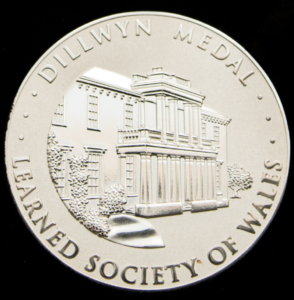 In her career to date, Dr Melen has made an outstanding contribution to chemistry, in the areas of catalysis, and energy. She has developed and utilized reagents for catalysing chemical transformations, and has worked to make catalysis a less toxic. Upon receiving the award, Dr Melen commented: “I would like to thank the Learned Society of Wales for the award of this medal. My research is in the area of catalysis and catalysts work by lowering the energy barrier for a chemical reaction thereby making reactions much more efficient. I must really thank my research group for all that they’ve done to help me succeed in this area.”
In her career to date, Dr Melen has made an outstanding contribution to chemistry, in the areas of catalysis, and energy. She has developed and utilized reagents for catalysing chemical transformations, and has worked to make catalysis a less toxic. Upon receiving the award, Dr Melen commented: “I would like to thank the Learned Society of Wales for the award of this medal. My research is in the area of catalysis and catalysts work by lowering the energy barrier for a chemical reaction thereby making reactions much more efficient. I must really thank my research group for all that they’ve done to help me succeed in this area.”
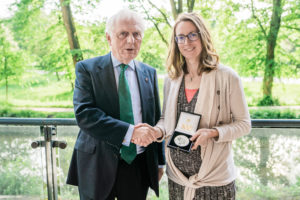
Dr Shepard is a biologist with a global reputation for her pioneering work on bird flight and bird behavioural responses to the aerial environment. She is an interdisciplinary scientist, collaborating with aeronautical engineers, meteorologists, mathematicians, physicists, and physiologists. Having been awarded the medal in recognition for her work, Dr Shepard said: “I started working on flight in 2010 and Swansea University has provided critical support in enabling this research to get going and build momentum. It has been a joy to work within the Welsh academic sector and get hands on with some of the spectacular Welsh wildlife, and I am honoured to have the work recognised through this award”.
Dr Stuart Fox and Dr Luke Sloan, both from Cardiff University School of Social Sciences, were awarded the Dillwyn medals for Social Sciences, Economics and Business this year.
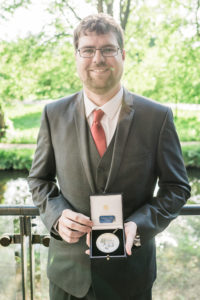 Dr Fox was awarded the medal for his work on the study of political and civic attitudes and behaviour, which uses social surveys and quantitative research methods. His work has considered young people’s political engagement, specifically during the EU Referendum and Brexit, and the 2017 general election. His recent work has also explored youth volunteering, and specifically whether it can help to engage more young people with politics and reduce inequalities in turnout, and he has worked with the Welsh Government’s Task and Finish Group on volunteering funding. On receiving the award, Dr Fox said:
Dr Fox was awarded the medal for his work on the study of political and civic attitudes and behaviour, which uses social surveys and quantitative research methods. His work has considered young people’s political engagement, specifically during the EU Referendum and Brexit, and the 2017 general election. His recent work has also explored youth volunteering, and specifically whether it can help to engage more young people with politics and reduce inequalities in turnout, and he has worked with the Welsh Government’s Task and Finish Group on volunteering funding. On receiving the award, Dr Fox said:
“The life of an early career researcher can be extremely challenging and unpredictable, and it is immensely gratifying to see such hard work recognised. I am extremely grateful to my colleagues for nominating me and providing invaluable support and guidance throughout my academic career, and I look forward to continuing to work with them to help develop the next generation of social researchers in Wales.”
 Dr Sloan was recognised for his work which has explored how social media, particularly Twitter, can be used to further social research. His work in this area is particularly noteworthy because it goes beyond asking when Twitter can tell us something about the world to ask more complex questions about the ethics and methodology of this research. Dr Sloan said: “I am humbled to receive this award. This is a wonderful surprise and very much appreciated”.
Dr Sloan was recognised for his work which has explored how social media, particularly Twitter, can be used to further social research. His work in this area is particularly noteworthy because it goes beyond asking when Twitter can tell us something about the world to ask more complex questions about the ethics and methodology of this research. Dr Sloan said: “I am humbled to receive this award. This is a wonderful surprise and very much appreciated”.
Professor Enlli Thomas, Professor and Director of Research and Impact, School of Education, Bangor University, was awarded the Hugh Owen Medal for contributions to educational research, in recognition of her expertise on the Welsh language, bilingualism, and studies into teaching, learning and using Welsh.
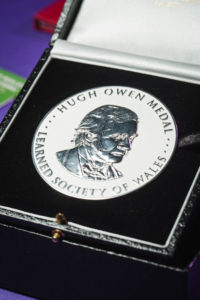 Accepting the award, Professor Thomas commented: “I’m extremely pleased to have been nominated for this prestigious award this year, and especially grateful to those who nominated me and to the Society for awarding me this wonderful medal and for the recognition of my work. It is a true privilege and an honour to have been able to work in an area that is very close to my heart for over 20 years – the acquisition of Welsh and bilingualism in children – and it is wonderful to be part of the national buzz as we develop strategies and evidence-based educational interventions in order to motivate more users of Welsh by 2050. “
Accepting the award, Professor Thomas commented: “I’m extremely pleased to have been nominated for this prestigious award this year, and especially grateful to those who nominated me and to the Society for awarding me this wonderful medal and for the recognition of my work. It is a true privilege and an honour to have been able to work in an area that is very close to my heart for over 20 years – the acquisition of Welsh and bilingualism in children – and it is wonderful to be part of the national buzz as we develop strategies and evidence-based educational interventions in order to motivate more users of Welsh by 2050. “
The Menelaus Medal is awarded to a researcher with a connection to Wales who demonstrates excellence in any field of engineering and technology. This year, Professor Roger Owen FREng FRS FLSW, Research Professor of Engineering, Swansea University, was awarded the medal for his ground-breaking work in the simulation of problems in science and engineering using computational methods. Over the last fifty years, the Finite Element Method has, by describing the behaviour of structures and systems in a discrete computational form, transformed solution procedures in almost all branches of engineering and has also impacted significantly on several scientific areas, for example biomedical engineering and the life sciences. He said:
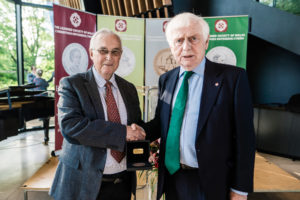 “Due to the international appeal of computational modelling, most of my research activities have involved universities and industrial organisations world-wide. Consequently, this Medal is one of the few awards that I have received from Wales but, given the esteem with which science and technology is held in the nation, it is one that ranks very highly in my lists of achievements.
“Due to the international appeal of computational modelling, most of my research activities have involved universities and industrial organisations world-wide. Consequently, this Medal is one of the few awards that I have received from Wales but, given the esteem with which science and technology is held in the nation, it is one that ranks very highly in my lists of achievements.
Although the past fifty years of computational modelling have proved to be exciting and rewarding, I am confident that emerging scientific areas will ensure that the future will be even more challenging. I believe that we who have worked, and continue to work, in the field of computational modelling should feel privileged by the experience.”
Reflecting on the medallists and their exceptional research, Sir Emyr Jones Parry, President of the Learned Society of Wales, commented: “It’s wonderful that we have this range of excellence which we are recognising with the award of these medals. It’s particularly encouraging that these include four very talented young researchers.”